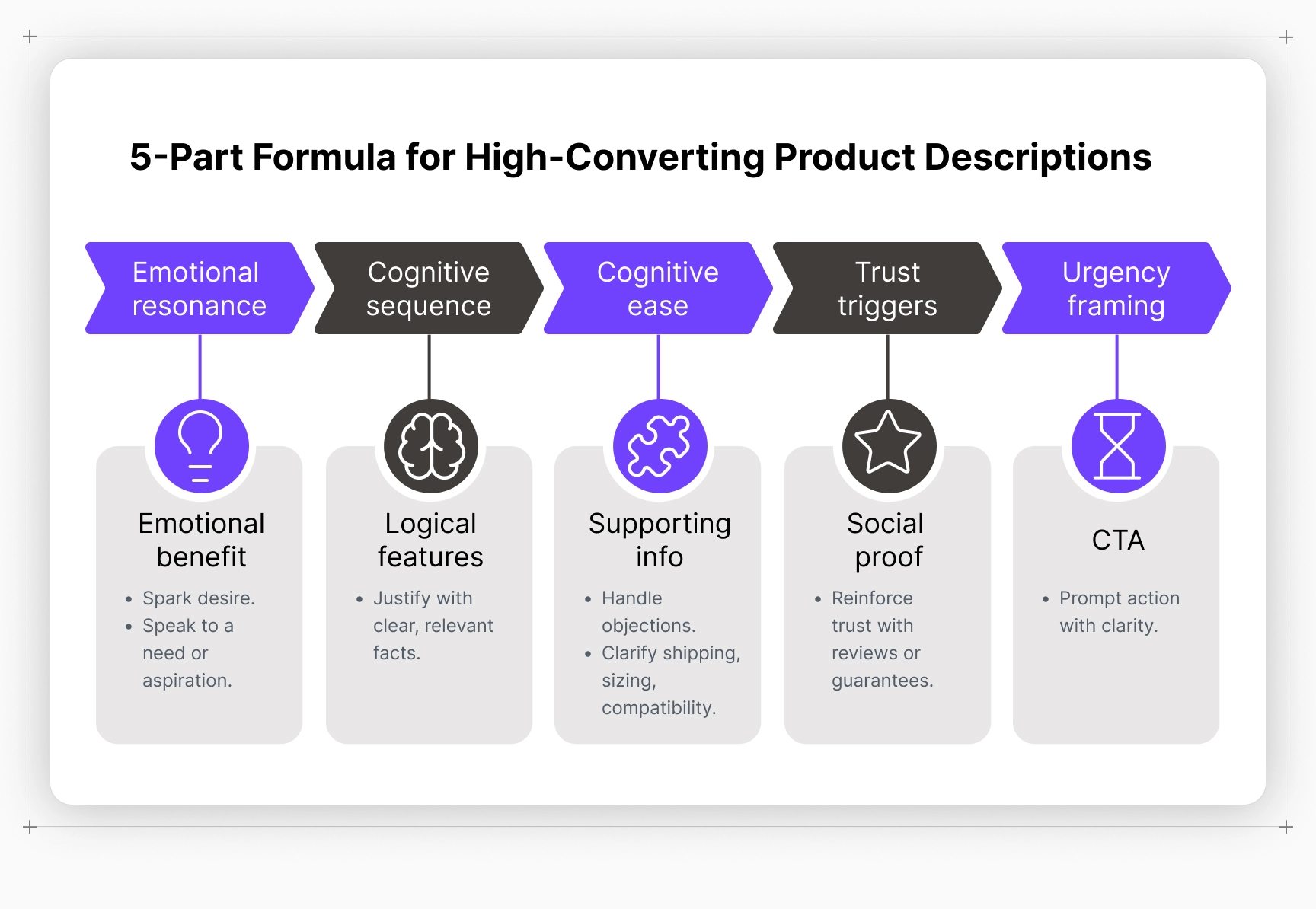Key Takeaways





Key Takeaways




If I’m being honest, I used to treat product descriptions as the final checkbox. The kind of task that got bumped behind tech setups, pricing strategies and campaign deadlines.
Like many others, I underestimated just how much they impacted the bigger system.
That changed when I started working with enterprise teams managing thousands of SKUs.
That’s when I saw the pattern: for the best-performing teams, product descriptions are structured assets, central to their search strategy, conversion funnel, and brand voice. Never treated as "just copy".
Done right, they help customers imagine the product in their life, surface the right results on search engines, and build trust at the decision point.
Done wrong? You lose revenue, relevance, and reach.
In this piece, we’ll explore what the best product descriptions actually do and how to optimize product descriptions at scale without writing every word by hand.
Let’s rethink what a product description is and what it should be doing for your ecommerce business.
{{cta}}
If you’re managing product content at enterprise scale, writing better product descriptions is only part of the equation. The real challenge is managing them across ever-changing assortments, teams, markets, and compliance layers.
Poor product descriptions lower conversion rates and weaken the operational systems your team depends on to scale.
Without structured governance, content spirals:
And while the symptoms may look like low performance, the root issue is usually inconsistency. Descriptions get copied, tweaked, translated, and scattered across tools without oversight, eroding clarity and brand voice at every turn.
Even high-quality product descriptions lose their value when no one’s sure which version is current or correct. And even the best product description can’t save a product page that buyers don’t trust.
Without structure, key information slips through the cracks. And your ecommerce site pays the price.
{{form}}
At enterprise scale, content volume isn’t your biggest challenge.
Content variability is.
One product might need a bulletproof compliance block, three regional variants, and a dozen localized specs. Another might need none of that. Multiply that by 5,000 SKUs and your copywriters are firefighting.
To scale product descriptions effectively, your team doesn’t need clever copy.
It needs structure that’s modular, repeatable, and built for reuse.
Scalable, SEO friendly product descriptions are modeled.
Built for consistency and performance, whether written manually or accelerated with AI.
Structured fields split the load:
This modularity powers filtered search, multilingual rollout, AI assistance, and headless builds. More importantly, it keeps your product pages consistent, trustworthy, and conversion-ready without writing from scratch every time.
Inside your PIM or CMS, templates and logic act as guardrails.
QA becomes scalable. Brand voice stays intact. Content is created once, reused everywhere, and governed centrally.
At scale, good templates do more than enforce consistency.
When the content inside is designed to guide, they lay the groundwork for high converting product descriptions.
Winning product description templates start with a clear emotional hook, support with factual details, and end with a clear next step.
Let’s have a closer look at what this actually looks like and why it works.
Structure scales content.
Copy moves people.
Persuasive product descriptions direct potential customer across the decision line.
Their structure reflects decision-making psychology.
Buyers respond emotionally, assess rationally, and seek reassurance before they act.

In well-crafted product descriptions, every line has a job: spark interest, deliver clarity, build trust, reduce risk, and drive action.
They lower hesitation, surface relevance, and build enough confidence to convert.
Before (generic phrases):
“This high-quality jacket is stylish, durable, and perfect for any occasion.”
After (high-converting):
Stay warm without the bulk. This water-resistant jacket features recycled insulation and packs down to fit in your daypack, whether you're commuting or climbing. Tested in alpine conditions. Free returns included.
Why it works:
Buyers make fast, layered decisions. First emotionally, then rationally, with reassurance before action.
This copy follows that sequence.
Here’s how each line in the “After” version pulls its weight:
{{table}}
Under the hood, it also reflects best practices for high-converting product descriptions:
Every line has a job to move the buyer forward with confidence and that’s how you create product descriptions that actually convert.
Descriptions that drive action are powerful. Descriptions that surface at the right moment? Unstoppable.
Product descriptions aren’t just for people. Structured, keyword-rich copy powers all the systems that help your target audience find and trust your product pages:
But only if your descriptions are precise, structured, and aligned with what customers are searching for.
This is where many brands fall short. Vague descriptions with generic phrases miss high-intent searches, stall customer engagement, and weaken page performance.
Meanwhile, compelling product descriptions that clearly highlight benefits, include relevant keywords, and reflect how your target customer searches online win visibility and conversions.
This is why we built Frontnow Enhance: to help ecommerce teams generate, structure, and scale product descriptions that serve both humans and algorithms with built-in compliance support for enterprise peace of mind. AI-powered product descriptions are also becoming part of that toolkit, speeding up the writing process while preserving quality and brand alignment.
{{enhance}}
Small business owners can handle variability manually.
At enterprise scale, it explodes into chaos unless modeled.
Because your product descriptions don’t just inform the target audience. They protect your brand identity and support the entire ecommerce business.
When the writing process is rooted in structure, key features are always clear, power words land where they matter, and search engines reward you with better search rankings. The result is a foundation that drives customer trust, product discoverability, and ultimately boost sales.
It starts with structure. It grows with strategy. And it pays off in every click, filter, and conversion.








Upgrade your data

Wow your customers








